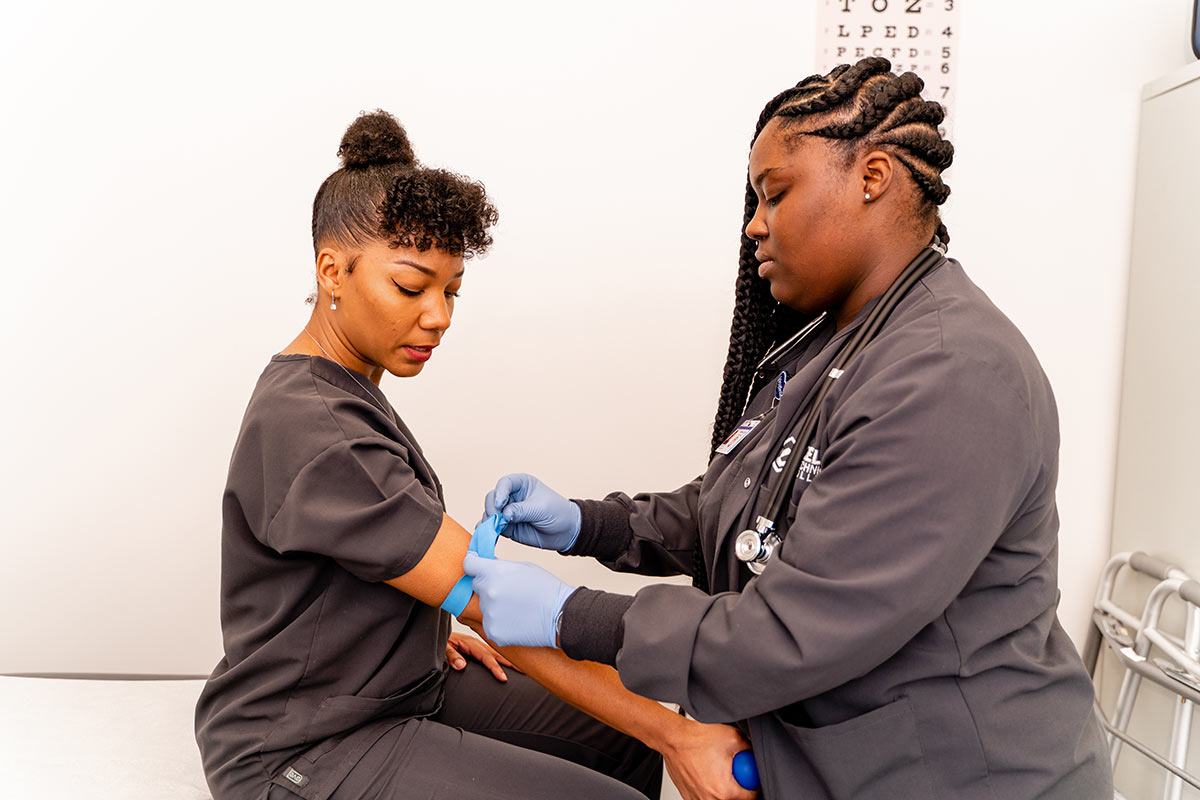Phlebotomy Classes Near Me: Your Complete Guide to Enrollment
Phlebotomy Classes Near Me: Your Complete Guide to Enrollment
Blog Article
The Path to Qualification: Recognizing the Phlebotomy Educating Program Trip and Its Significance
As you think about the course to qualification in phlebotomy, it's essential to recognize the duty you'll play in healthcare. Your training will cover vital skills, from blood collection techniques to patient interaction.

The Role of Phlebotomists in Healthcare
Phlebotomists play a necessary duty in the medical care system, acting as the vital web link in between individuals and vital diagnostic screening. You'll carry out blood attracts, guaranteeing samples are gathered precisely and securely. Your experience helps in detecting medical conditions, monitoring health and wellness, and guiding treatment decisions.
In your daily interactions, you'll need to establish trust fund with people, making them really feel comfortable during what may be a stressful experience. You're accountable for labeling and handling examples thoroughly to protect against contamination or mistakes, which can influence test outcomes.
Yet, you'll commonly work alongside doctors and registered nurses, interacting crucial information concerning individuals' problems. Your duty is essential in keeping the operations in medical care settings, ensuring prompt and exact outcomes. By mastering your abilities, you contribute meaningfully to patient treatment, making you an indispensable component of the medical group. Embracing this responsibility is crucial to your success as a phlebotomist.
Introduction of Phlebotomy Training Programs
When checking out phlebotomy training programs, you'll locate different types designed to fit different routines and finding out designs. Each program aids you develop essential abilities like blood collection and individual interaction. Understanding these alternatives is crucial to picking the best course for your job.
Kinds of Educating Programs
Several kinds of training programs are readily available for those wanting to come to be skilled in phlebotomy. You can select from certificate programs, which usually last a couple of months and concentrate on vital skills. There are likewise diploma programs that give an even more detailed education, usually lasting approximately a year. If you're looking for a deeper understanding, an associate level in an associated area may be the right fit. On the internet training courses offer versatility for those stabilizing work or family members commitments, permitting you to examine at your very own pace. Furthermore, some medical facilities and facilities provide on-the-job training programs, giving useful experience while you discover. Whatever course you pick, each program intends to outfit you with the necessary skills for a successful phlebotomy occupation.

Key Skills Established
Mastering phlebotomy requires a set of key abilities that are developed through thorough training programs. You'll find out technical skills like correct blood vessel choice, needle insertion, and blood collection strategies. These hands-on methods ensure you can perform treatments securely and efficiently. Furthermore, interaction abilities are essential; you'll need to connect with individuals, explain procedures, and placed them at simplicity. Comprehending composition and physiology is important, too, as it helps you locate capillaries and comprehend the body's action to blood draws. Ultimately, you'll acquire knowledge of security procedures and infection control, assuring you maintain a sterile environment. Each of these abilities is important for your success as a certified phlebotomist, making you a valuable property in any kind of health care setup.
Secret Elements of a Phlebotomy Program
In a phlebotomy program, you'll concentrate on crucial topics that lay the foundation for your future occupation. You'll involve in hands-on training that permits you to apply what you've discovered in real-world setups. Both the core curriculum and practical experience are crucial for your success as a phlebotomist.
Curriculum Introduction
While pursuing a phlebotomy training course, you'll come across a curriculum made to furnish you with essential skills and expertise. Phlebotomy Classes Near Me. This educational program typically consists of composition and physiology, focusing on the circulatory system and recognizing blood components. You'll likewise discover various kinds of blood collection techniques, including venipuncture and capillary leak methods
Additionally, infection control and security methods are vital components, guaranteeing you know how to maintain a sterile atmosphere. You'll research patient communication, emphasizing communication and empathy, which are important for easing client stress and anxiety.
Hands-On Training Experience
Getting hands-on experience is an essential part of your phlebotomy training program. This useful training allows you to use what you have actually discovered in a real-world setting, improving your abilities and self-confidence. You'll practice venipuncture techniques, find out how to deal with various types of specimens, and obtain aware of the equipment made use of in the field. Under the advice of skilled instructors, you'll fine-tune your abilities, ensuring you're planned for any type of scenario you might deal with.
In addition, you'll obtain the chance to engage with patients, which is vital for creating your interaction skills. This combination of technical effectiveness and social abilities is crucial for your success as a licensed phlebotomist. Inevitably, hands-on training is where concept fulfills technique, solidifying your understanding and preparedness for qualification.
Qualification and Licensing Requirements
Before you can start your career in phlebotomy, it is crucial to recognize the certification and licensing requirements that vary by state. A lot of states call for phlebotomists read review to hold a certification from an acknowledged company, such as the National Phlebotomy Organization or the American Culture for Professional Pathology. These certifications usually include passing a test that examines your knowledge and skills in the field.
Along with certification, some states have particular licensing demands. You may need to complete a specific number of hours in medical method, submit proof of training, or go through a background check. It is essential to research your state's policies to make sure you satisfy all required criteria.
Staying informed concerning these needs not just aids you protect a setting however also enhances your reliability as a professional. By fulfilling these needs, you'll be well on your means to an effective profession in phlebotomy.
Hands-On Training and Practical Experience
Hands-on training and useful experience are vital components of your phlebotomy education and learning, as they permit you to use theoretical knowledge in real-world scenarios. Throughout your training, you'll participate in supervised venipuncture, learn proper techniques, and come to be acquainted with various blood collection equipment. This straight involvement is crucial for building your self-confidence and developing your skills.
You'll function closely with seasoned experts who can assist you through the subtleties of client interaction and sample handling. Each session not just strengthens your understanding however likewise prepares you for the hectic setting of medical care settings.
In addition, several programs integrate medical rotations, permitting you to experience diverse setups, from healthcare facilities to outpatient clinics. This direct exposure helps you adjust to various difficulties and person requirements, guaranteeing you're well-prepared for your future role. Welcome these opportunities, as they're important to ending up being a skilled and thoughtful phlebotomist.
Challenges Dealt With Throughout Training
While acquiring hands-on experience is crucial, it is essential to identify the challenges that can develop throughout your phlebotomy training. You may come across anxiety when doing treatments on actual patients, particularly if you're brand-new to the setting. The stress to get every little thing right can be overwhelming. Additionally, grasping the abilities required for blood draws takes method; you may battle with strategy initially.
Time try this website management can likewise be an obstacle, as balancing theory, useful sessions, and personal commitments can feel intimidating. You may face varying learning paces among your peers, leading to feelings of insecurity if you assume you're falling back. Ultimately, adjusting to the different characters of trainers can be challenging, as each may have an unique teaching design.
Acknowledging these obstacles at an early stage can prepare you for success and help you develop strength throughout your training trip.
Profession Opportunities After Accreditation

As you gain experience, you could even take into consideration specializing in locations like pediatric or geriatric phlebotomy, satisfying particular person requirements. Some phlebotomists pick to advance their occupations by becoming lab technicians or going after more education in health care areas.
In addition, your accreditation can bring about roles in training or overseeing brand-new phlebotomists, allowing you to share your understanding. With the medical care sector constantly growing, your abilities will certainly constantly be in demand, paving the method for a secure and fulfilling profession. Accept the chances awaiting you!
Regularly Asked Questions
What Is the Common Duration of a Phlebotomy Educating Training Course?
Phlebotomy training programs typically last around four to eight weeks. You'll participate in hands-on method, classroom direction, and on the internet discovering. Finishing this training prepares you for qualification and a rewarding career in healthcare.
Are Online Phlebotomy Courses Available?
Yes, online phlebotomy courses are available. They provide versatility and benefit, enabling you to examine at your own pace. Just verify the program is accredited to fulfill qualification needs and obtain beneficial abilities for your occupation.
Just How Much Does Phlebotomy Training Normally Expense?
Phlebotomy i was reading this training normally costs between $700 and $2,500, depending on the program and area. You need to consider factors like course size, consisted of materials, and hands-on experience when choosing the appropriate training for you.
What Are Common Requirements for Phlebotomy Training?
Typical requirements for phlebotomy training commonly include a senior high school diploma or GED, immunizations, and a history check. Some programs may additionally need standard health care knowledge or accreditations, ensuring you're gotten ready for hands-on training.
Can I Function While Completing My Phlebotomy Training?
Yes, you can function while completing your phlebotomy training. Lots of students equilibrium work with their research studies, but ensure to manage your time efficiently to guarantee you satisfy both work and training dedications successfully.
Report this page